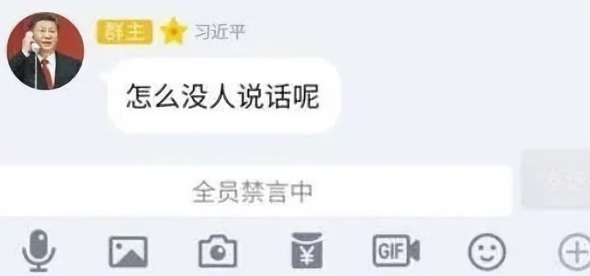
Two posts from nationalist pundit and former Global Times Editor-in-Chief Hu Xijin criticizing what he describes as a “collective silence” on Chinese social media have sparked intense discussion on Chinese and overseas websites. The posts, published earlier this month by Hu on his personal WeChat account and his Weibo account, respectively, lament this lack of robust societal debate, and place the blame, variously, on bureaucratic formalism, self-censorship, employer-driven censorship, online trolls, and society in general.
At The East is Read, Yirui Li and Yuxuan Jia offered a full translation of Hu’s first post, “How to continuously advance tolerance and freedom under the constitutional order,” a portion of which is excerpted below:
It is worth noting that the West has long touted its “freedom.” If China, drawing on growing hard power and rising confidence, also advances tolerance and freedom under its constitutional order, that would puncture the remaining sense of Western arrogance, complete the core elements of China’s soft power, and in turn foster a new level of societal confidence. From a higher platform of development, many long-standing problems that have plagued China would be resolved.
In fact, democracy and freedom are explicitly listed among the core socialist values [prosperity, democracy, civility, harmony, freedom, equality, justice, the rule of law, patriotism, dedication, integrity and friendliness], serving as important goals in the construction of Chinese society. However, the real reason for the insufficient development of social tolerance and freedom lies in bureaucratism and the practice of formalities for formalities’ sake. [Source]
Hu’s follow-up post, which appeared a few days later on Weibo, where he has nearly 25 million followers, focused on factors that have brought about a chill in China’s online environment. At Pekingnology, Yuxuan Jia published a full translation, a portion of which appears below:
Many people are growing far more cautious about speaking on social media or have stopped posting altogether. Celebrities’ feeds that once chatted about daily life are now mostly for official announcements. People in the state system tread even more carefully: many no longer post to their WeChat Moments [similar to Facebook or Instagram posts visible to friends]; if they do, it’s just a repost of a state media report.
[…] Why is this happening? At root, society’s tolerance has narrowed.
[…] First, the overall online climate has turned harsher. The hunt for “flaws” is frequent and meticulous. Once a target is found, attention converges fast; the digging and attempts to “connect the dots” seem endless, and all too often things are blown up into sweeping indictments. That kind of risk is hard for anyone to bear. For public employees within the state system or mid-level managers at a private company, it can easily implicate the organisation behind them.
[…] Secondly, on the internet, a few lines are routinely over-interpreted, or a photo’s meaning is stretched, and the backlash quickly shifts to the person’s organisation.
[…I]t’s definitely not a good sign that so many verified groups now opt for silence online. Widening social tolerance under the constitutional order is a practical lever worth pursuing. Society should be diverse and vibrant; social media should be a platform for everyone to share information. If some groups withdraw or go deeply passive, leaving only others to speak, the outcome won’t be healthy, and new problems will follow. [Source]
Hu Xijin’s remarks caused heated debate among Chinese netizens. Many recognized the irony that Hu, as an inveterate propagandist for the Party state, was complicit in shaping the very online environment he is now bemoaning, and that his criticism is akin to a thief crying “Stop, thief!” Others noted that constraints on free speech must be truly dire for a privileged public figure such as Hu to lament that public debate in China is “not free enough.” There was also speculation about whether Hu was truly speaking from the heart, or if his recent pronouncements were some sort of ploy, an updated “Hundred Flowers Campaign” designed to trick the unwary into speaking recklessly. Hu was also attacked by some of his fellow pro-establishment nationalists, who dubbed him a “public intellectual” (公知, gōngzhī, used by some nationalists as a slur) and excoriated him for what they perceived as excessive liberalism.
CDT Chinese editors have archived four articles (one censored) about the controversy over Hu’s posts, and a collection of netizen comments representing a range of political viewpoints. In an article that has since been censored, WeChat blogger Cicero by the Sea generally agrees with Hu’s assessment that people have become more hesitant to speak, and gives some examples from his own experience of being harassed by online trolls for raising legitimate questions about the safety of Xiaomi electric vehicles after two fatal crashes of Xiaomi SU7 EVs. But the author also writes that Hu never really attempts to analyze what underlies China’s chilling online silence: to highlight this point, Cicero by the Sea begins and ends his now-deleted article with the plaintive question, “But why?” Another archived WeChat article, “Why I Say ‘Don’t Feed the Beast,’” begins with a complaint about the Shanghai Celebili Music Festival cancelling performances by German electronica band Kraftwerk and Chinese singer-songwriter Zuoxiao Zuzhou for reasons of “force majeure.” It then goes on to criticize Hu Xijin’s take on freedom of speech as hypocritical and pointless, and urges readers not to “feed the beast” by engaging with Hu’s ideas. In “The Internet ‘Falls Silent’ and Editor-in-Chief Hu Thinks It’s All Society’s Fault,” blogger Xiong Taihang mocks Hu Xijin’s twisted logic and likens the Chinese internet to a hostile workplace filled with unsupportive bosses and colleagues eager to stab you in the back.
A final satirical article, “Hu Xijin Has Started Complaining That Society Isn’t Tolerant Enough,” comes from the WeChat account Mu Xi Says. Author Mu Xi points out that it is only Hu Xijin’s extremely privileged position that allows him to speak as he does. After listing numerous contradictory and hypocritical comments that Hu has made over the years—prime examples of “whataboutism”—Mu Xi ends on this note:
As people like Hu Xijin become more powerful, diverse voices inevitably perish. But once those diverse voices die out, Old Hu feels a sudden stab of loneliness and calls out, “Why’s everyone so quiet? Feel free to speak your mind!” This is rather like the head palace eunuch asking a junior eunuch, “Hey, how come your equipment is only good for taking a leak?” [Chinese]
The comments translated below were compiled by CDT Chinese editors from Weibo, with a few from X. They give a sense of the diverse range of reactions to Hu’s recent pronouncements on freedom of speech and freedom of expression. For convenience, they have been divided into three general categories: pro-establishment, supportive, and sarcastic:
“Little Pink” and pro-establishment comments:
欧洲小吏: Gone are the days when you obsolete colonial bootlickers, wannabe intellectuals, and public figures could stir up people’s emotions online without being called to account.
DBL-miemie: So now that public opinion has shifted and people aren’t so easily duped, he feels like there isn’t enough “freedom.”
甄孜言: Why not just admit you’re nostalgic for the past, when wannabe intellectuals were allowed to run amok online, polluting the internet?
文明交流-要不哥哥怼你到破防: Aren’t we tolerant enough as it is? Practically every day, there are a bunch of online losers trampling on our nation’s flag, and they always get away with it.
领事闲谈: Haha, that old cliché. I’m a civil servant and I manage to post things every day just fine. The only people who worry are those with something to hide, especially certain “proxies,” talking about topics that can’t stand up to scrutiny.
景明同学111: So you’re only capable of speaking if you’re allowed to trash-talk China, the Party, and Socialism, is that it?
Supportive comments:
ming-ustc: I agree with Old Hu on this point: more tolerance, less antagonism.
L秋水孤鹜: Be open-minded, foster a relaxed and inclusive public-opinion climate, and let people exercise their due right to freedom of speech! Don’t do things that create a “chilling” effect.
航行-RXG: Most of the people I follow haven’t posted on Weibo in a few years.
看看就好有啥好看的: Without tolerance, how can we ever have consensus, or social progress?
十里坡剑神啊: The Chinese internet is dead. There’s nothing worthwhile left.
崔曦文18: There are more crazies than ever, but now they’re considered mainstream.
叶辉姓贾: It took me a while to even work up the nerve to “like” your post.
-中医上工-: Only Old Hu would be bold enough to broach such a sensitive topic.
椰子树上叶子01: My boss said we can’t post stuff about our personal lives, only content from public WeChat accounts, so now everyone at work is setting up burner accounts.
一蹴而就啊: This is the one time I’m not going to argue with Ol’ Hu, because I totally agree with him!
许了个仙2109: If you really want everyone to be able to speak freely, first get all the major platforms to stop filtering sensitive words.
Critical and sardonic comments:
股海东方不败: But why is everyone is too scared to speak out? I can’t believe Old Hu doesn’t understand the underlying reason.
一切为了大局: Ol’ Hu, this is a good thing. It means there’s less “negative sentiment.”
消化科倔老头: On the one hand, you’ve got people staying silent out of fear; on the other, people spouting endless bullshit … Ol’ Hu definitely understands the reason why.
重在参与的过程: Old Hu is actually a beneficiary of the current situation.
ChrisMu35642495: “Frisbee-catcher” lapdog, stop complaining. You played a part in this.
瀚瀚de幸运花骑士: Old Hu, you’re just trolling, aren’t you? You’re rotten to the core.
勤奋的男人使命: Old Hu went from the rearguard to the vanguard [of free speech]. Back when the winds were blowing his way, he could piss for yards. Now that the winds have shifted direction, he’s always getting his shoes wet.
jiamama0101: Old Hu deserves a lot of “credit” for the state of the internet today!
SupremeLeaderXi: This is China~:
Host: Xi Jinping
Speech bubble: Why isn’t anyone talking?
Message at bottom: All participants have been muted.
[Chinese]





